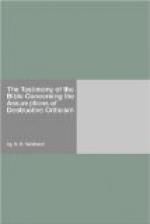Our critics have robbed Isaiah of this passage. It was written, so their literary skill claims to have discovered, by some prophet who has successfully concealed himself, and finally disappeared from sight, leaving no hope that his name will ever be discovered.
Luke informs us that he knew who the prophet was that penned that touching description of the coming Messiah, and that his name was Isaiah. This question he has settled.
Turning to the gospel of John, we are furnished the testimony of one of whom our Lord said, “Verily I say unto you, Among them that are born of woman, there hath not risen a greater than John the Baptist.” This witness comes before us, therefore, indorsed by Jesus Christ himself, “The faithful Witness.” We ask him, therefore, to speak for himself as to who is the author of that part of prophecy which the critics are attempting to wrest from Isaiah.
When the priests and Levites came to ask him, “Who art thou? That we may give an answer to them that sent us. What sayest thou of thyself?” he replied, “I am the Voice of one crying in the wilderness, make straight the way of the Lord, as said Isaiah the prophet.” (See John i. 22, 23, R.V.)
This was his testimony, first concerning himself. We believe him. And this was his testimony, secondly, concerning the author of the prophecy which he quoted: “Isaiah the prophet.”
Again we believe him, and as confidently, concerning the second statement as the first. And the Apostle John was so confident of its truth that he put it on record.
The passage quoted (Isaiah xl. 3) belongs to that part of the book which our critic and his fellow critics have decided was predicted by some stray prophet, unknown to the world, to the Jewish people or the church. We prefer the statement of John the Baptist, and its indorsement by John the Apostle.
The reader will now recall that we have already heard Matthew’s corroboration of the testimony of John the Baptist concerning Isaiah’s claim to this prophecy. (See Matt iii. 3.)
In the gospel of the Apostle John he puts on record his personal testimony concerning the author of the book bearing Isaiah’s name. Explaining the amazing unbelief of the Jews, he says (xii. 37, 38): “But though he (Jesus) did so many signs before them, yet they believed not on him: that the word of Isaiah the prophet might be fulfilled, which he spake:
“Lord, who hath believed our report? and to whom hath the arm of the Lord been revealed?” (R.V.)
The reader will see that this inspired writer of the fourth gospel is quoting from Isaiah liii. 1, thus testifying to Isaiah’s authorship.
Our literary critics have decided that this chapter was forbidden ground to Isaiah, that, if we are to believe them, he had no connection with this prophecy.




